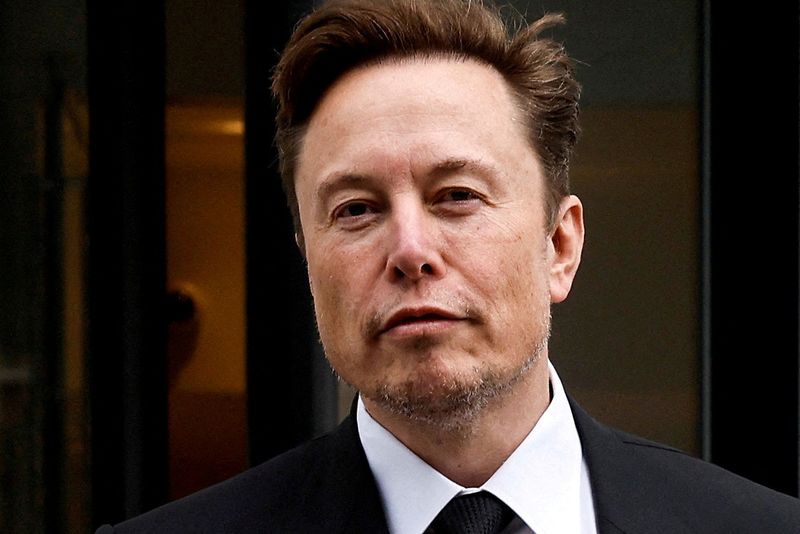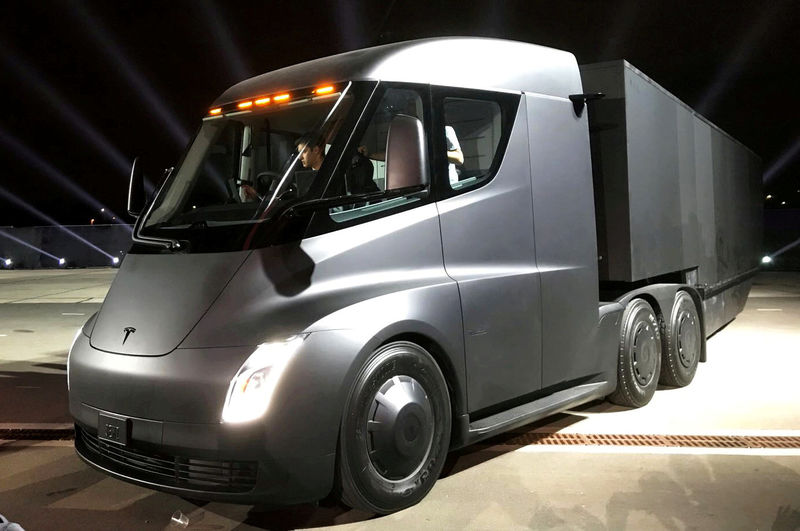[ad_1]

© Reuters. FILE PHOTO: Tesla CEO Elon Musk and his security detail depart the company’s local office in Washington, U.S. January 27, 2023. REUTERS/Jonathan Ernst/File Photo
By Jody Godoy and Hyunjoo Jin
SAN FRANCISCO (Reuters) -Elon Musk’s liability for tweeting in 2018 about financing for a buyout of Tesla (NASDAQ:) Inc is now in a jury’s hands, after a shareholder lawyer said on Friday that the billionaire was not above the law while Musk’s lawyer said his client was not a “tweeting monster.”
A nine-person jury began deliberations in San Francisco federal court on whether Musk’s tweets artificially inflated Tesla’s share price by playing up the likelihood of a buyout, and if so by how much.
Unhappy shareholders accused the Tesla chief executive officer of misleading them on Aug. 7, 2018, by tweeting that he was considering taking the electric car maker private at $420 per share and had “funding secured.”
The price was 23% above Tesla’s last closing price, valuing the company at $72 billion. Shareholders also said Musk lied by tweeting later that day that “investor support is confirmed.”
With Musk looking on, shareholder lawyer Nicholas Porritt emphasized during his closing argument how U.S. District Judge Edward Chen had ruled before trial that Musk’s tweeting was false and reckless.
“This case ultimately is about whether rules that apply to everyone else should also apply to Elon Musk,” Porritt said.
Musk is the world’s second-richest person.
His lawyer, Alex Spiro, countered during his closing argument that funding was “not an issue” for a Tesla buyout, and that Musk was not the “rich liar” and “fire-breathing, tweeting monster” that he said the shareholder lawyers tried to portray.
“This isn’t the ‘bad tweeter’ trial,” said Spiro, who also represents Tesla.
Investors are seeking billions of dollars in damages from Musk, Tesla and several company directors, in a test of Musk’s liability for his sometimes impulsive use of Twitter. He bought that company in October for $44 billion.
WHEN ELON TWEETS, PEOPLE LISTEN
Porritt told jurors that Tesla should be liable because it let Musk use Twitter to disseminate corporate information, and recognized that “when Elon tweets about Tesla, people listen.”
Tesla’s share price traded above where it had been before Musk’s tweets for much of the 10-day period covered by the lawsuit, but fell as it became clear no buyout would happen.
Spiro rejected shareholders’ claim that some of that decline stemmed from an Aug. 17, 2018, New York Times story questioning the funding.
He said the decline was prompted by concern about Musk’s health, from the stress of trying to build more Tesla Model 3 sedans.
Spiro also said the “funding secured” tweet was “technically inaccurate” but not fraudulent, and did not “move the market” by pushing up Tesla’s stock price.
“Who cares about bad word choice?” Spiro said. “Just because it’s a bad tweet doesn’t make it fraud.”
Michael Hartzmark, an expert witness for the plaintiffs, had testified that Musk’s comments about “taking Tesla private” with “funding secured” should be viewed as a set. Hartzmark did not calculate how much each component affected Tesla’s stock price.
During the three-week trial, jurors heard testimony from witnesses including Tesla directors, Musk’s financial advisers and Musk himself.
Musk testified that he received a verbal commitment from Saudi Arabia’s sovereign wealth fund, and could have used his stake in SpaceX, a rocket company where is also CEO, to fund a buyout, but admitted he lacked specific commitments from potential backers.
Porritt tried to highlight the lack of written evidence that funding was available from the Saudi fund.
“Does that sound even remotely credible?” he said.
The defense has said that in tweeting, Musk was focused on making sure small shareholders had the same information as large investors who knew about the potential buyout.
[ad_2]
Source link
